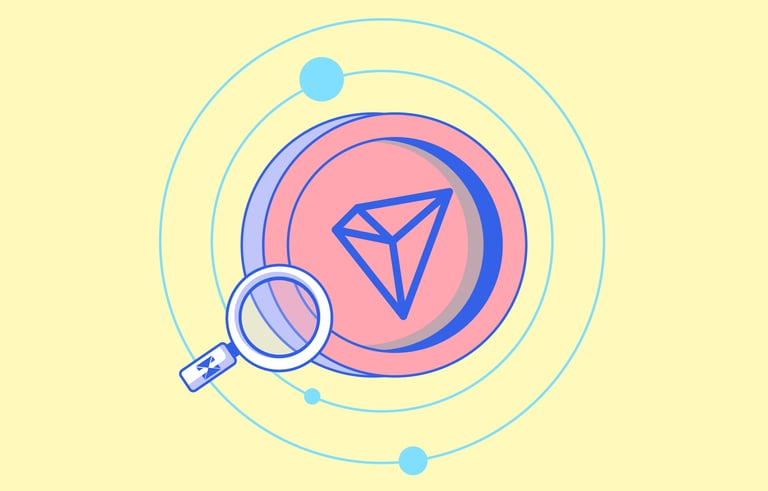What is Tron (TRX)? How Does it Work?
Tron (TRX) is a blockchain platform that was founded in 2017 by entrepreneur Justin Sun. Its main purpose is to change the way digital content is shared, consumed, and distributed. Instead of following the usual method of content distribution, Tron aims to create a decentralized and transparent platform where creators, developers, and users can interact freely.
Tron focuses on entertainment, content creation, and various other industries, utilizing blockchain technology to securely record transactions and activities taking place on its blockchain network. The platform's ultimate vision is to build a more open, transparent, and decentralized internet where creators and consumers can directly connect without relying on intermediaries.
How Does Tron Work?
1. Blockchain Protocol: Tron operates using its own blockchain protocol, which employs a Delegated Proof-of-Stake (DPoS) consensus mechanism. In simple terms, instead of all users participating equally in validating transactions, a selected group of trusted individuals, known as block producers, are responsible for this task. It's akin to a committee handling the verification process to ensure efficiency and scalability.
2. Smart Contracts: Think of smart contracts as digital agreements that automatically execute and enforce themselves when certain conditions are met. For example, let's say Alice wants to sell her digital artwork to Bob. They can create a smart contract stipulating that once Bob transfers the agreed-upon amount of TRX (Tron's cryptocurrency) to the contract, ownership of the artwork automatically transfers to him. This eliminates the need for intermediaries and ensures trustless transactions.
3. Tron Virtual Machine (TVM): TVM acts as the virtual environment where smart contracts run on the Tron network. It's like the operating system for these contracts, allowing developers to write them in programming languages such as Solidity. An analogy would be a computer's operating system, which provides the platform for running various software applications.
4. Decentralized Applications (DApps): Decentralized applications, or DApps, are applications that operate on a blockchain network without a central authority controlling them. For instance, there could be a gaming DApp where players can trade virtual assets securely, a financial DApp for decentralized lending and borrowing, or a social media DApp where users are rewarded with TRX for engaging with content. These DApps showcase the diverse functionalities that the Tron network supports.
5. TRX Token: TRX is the native cryptocurrency of the Tron blockchain, similar to how Bitcoin functions on its own network. Users can obtain TRX through various means such as mining (although Tron mainly uses a different mechanism called staking), purchasing on exchanges, or participating in token sales. TRX can also be used for various purposes within the Tron ecosystem, such as paying for transaction fees or participating in DApps.
How to Buy Tron
To buy Tron, you can visit our trusted cryptocurrency exchange platform, Hata.io and follow these simple steps:
1. Sign Up: Create an account on Hata.io by providing your email address and set up a secure password.
2. Complete Verification: Verify your identity by providing the necessary documents as per the platform's KYC (Know Your Customer) requirements.
3. Deposit Funds: Deposit funds into your Hata.io account using fiat currency or other cryptocurrencies supported by the platform.
4. Search for TRX: Navigate to the trading section and search for TRX in the list of available cryptocurrencies.
5. Place Order: Enter the amount of TRX you wish to purchase and review the order details. Once satisfied, place your buy order.
6. Confirm Purchase: Confirm your purchase, and the TRX tokens will be credited into your Hata.io account.
Now you're all set to explore the exciting world of Tron and its ecosystem of decentralized applications and services.
FAQ (Frequently Asked Questions)
1. What makes Tron different from other cryptocurrencies?
Tron stands out for its focus on decentralizing the internet and creating a platform for content creators to interact directly with their audiences. Its robust infrastructure, scalability, and support for decentralized applications sets it apart from other cryptocurrencies.
2. How secure is Tron?
Tron utilizes advanced blockchain technology, including its DPoS consensus mechanism and smart contract functionality, to ensure security and transparency within the network. However, like any blockchain platform, users should exercise caution and adhere to best security practices when engaging with Tron.
3. Can I mine Tron?
No, Tron cannot be mined like traditional cryptocurrencies such as Bitcoin. Instead, TRX tokens are pre-mined, and users can acquire them through exchanges, participating in token sales, or as rewards for contributing to the network through staking.
4. What are some popular decentralized applications (DApps) built on Tron?
Tron hosts a diverse range of DApps across various industries, including gaming, social media, decentralized finance (DeFi), and more. Some popular examples include BitTorrent, JUST, and TRONbet.
DISCLAIMER & WARNING
The information provided here is presented "as is'' and is intended for general informational and educational purposes only. It does not come with any representation or warranty of any kind. This content should not be interpreted as financial, legal, or other professional advice, and it is not intended to endorse or recommend the purchase of any specific product or service. It is advisable to consult with appropriate professional advisors for personalised guidance. In cases where the article is contributed by a third-party author, please note that the expressed views belong to the author alone and may not necessarily reflect the opinions of Hata. For furthedetails, we encourage you to read our complete disclaimer. Please be aware that the prices of digital assets can be highly volatile. The value of your investment may increase or decrease, and there is a risk that you may not recover the full amount invested. You are solely responsible for making your own investment decisions, and Hata cannot be held liable for any losses you may incur. This material is not to be construed as financial, legal, or other professional advice. For more information, please refer to Hata’s Terms of Use and Risk Warning


